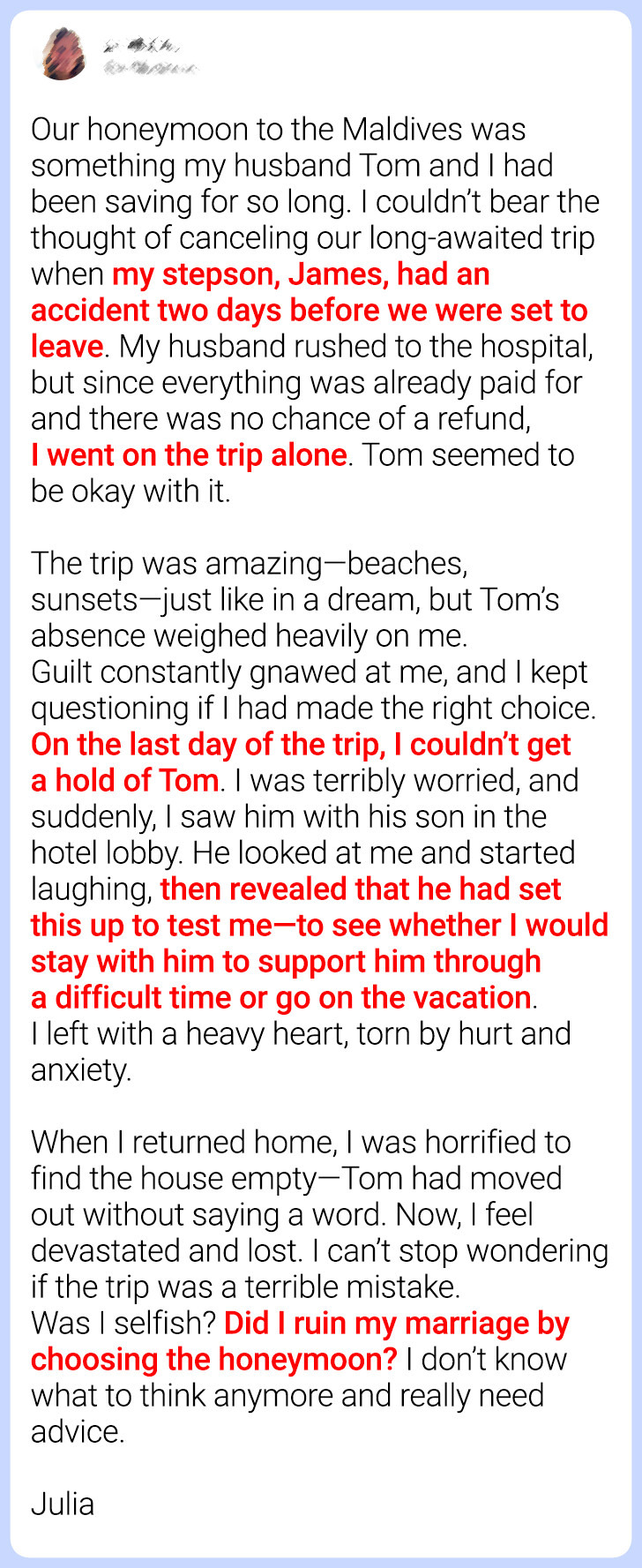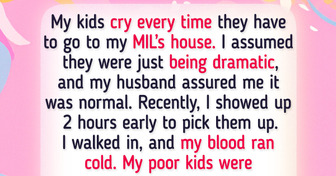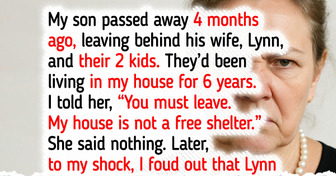If he is testing you it means that he was not ready for marriage. If his former wife, his son's mother, is still alive I would talk with her. I have a feeling that if they got divorced it was the marriage test bull$#!+.
I Refused to Cancel the Trip Due to My Stepson’s Accident

Julia reached out to us, describing how her marriage is falling apart before her eyes. She blames herself for choosing a vacation instead of being there for her husband during this difficult time. At the same time, she feels hurt by her husband’s actions.

Julia, it seems you’re feeling deeply conflicted and burdened by everything that’s unfolded, which is entirely understandable given the circumstances. Remember, hindsight often amplifies guilt and regret far beyond what’s deserved. Here are a few perspectives that might help you navigate this difficult situation.
Take a moment to pause and reflect on your decisions and feelings.
It’s completely normal to second-guess your decisions after everything that’s unfolded, but taking the time to reflect is essential for understanding how you arrived at this moment. Reflection helps you uncover the motivations behind your choices and, more importantly, allows you to evaluate your true feelings about the situation.
Consider this: Was your decision to go on the trip solely about the financial investment, or was it also tied to deeper issues in your relationship? Often, our actions are influenced by unresolved emotions or unmet needs that we may not fully recognize in the moment. By exploring these feelings, you can gain valuable insight into how to proceed.
Make open and honest communication with your partner a top priority.
The cornerstone of any relationship is communication, particularly during challenging moments. At this point, it’s uncertain whether Tom feels betrayed or if he had been wrestling with doubts about your relationship long before the trip. When both of you are prepared, it’s essential to have an open and honest conversation.
Inquire about his feelings regarding your choice to go on the trip, and share your own perspective as well. Clear and empathetic communication will foster mutual understanding and help you navigate the future of your relationship. Even if the discussion proves difficult, it’s far better to openly express your thoughts and feelings than to make assumptions about each other’s emotions.
Embrace self-forgiveness and nurture self-compassion.
Embrace the practice of self-forgiveness and cultivate self-compassion. It’s essential to acknowledge that everyone makes mistakes and faces tough choices in life. Instead of being harsh on yourself, allow space for understanding and kindness towards your own feelings.
Recognize that your intentions were not rooted in selfishness but rather in seeking happiness and fulfillment during a challenging time. Remind yourself that it’s okay to have conflicting emotions and that healing takes time. By forgiving yourself, you can begin to move forward and rebuild your sense of self-worth.
Consider reaching out for professional support.
Consider reaching out for professional support to help you navigate your emotions and facilitate healing. A therapist can provide a safe space for you to explore your feelings, gain perspective on the situation, and develop strategies for moving forward. Seeking guidance from a mental health professional can be an invaluable step in your journey toward recovery and clarity.
Here’s another story in which a woman had a falling out with her husband over his daughter from a previous marriage.
Comments
What an outrageous trick to pull on someone you supposedly love. Please get rid of him. You did absolutely nothing wrong.
This article talks about her guilty about going on a full paid non-refundable honeymoon without her husband, but never talks about his seeming need to know if she would throw away a trip they had planned and the money for it. I would suspect that the 'accident' the son-in-law 'suffered' was miner because I doubt that she would have been able to go if it wasn't. Not once is it brought up about the fact that her husband LIED to her, it is all about her getting help for her problem and never says anything about her lying husband and the further fact that he used his own son in that lie.
Related Reads
My MIL Lost Her Privilege of Being Called “Grandma” — What She Did to My Kids Left Me Speechless

10 Common Fashion Mistakes That Secretly Age You

These Are the Real-Life Partners of 10 Stars Everyone Loves

We Modernized 18 Vintage Hollywood Icons — You Won’t Believe How Different They Look

10 Smart Beauty Secrets Celebrities Use to Look Effortlessly Gorgeous

I Threw Out My Late Son’s Family — My House Isn’t a Charity

14 Celebrities Who Breathed New Life Into Legendary Outfits

14 Celebrities Whose Appearance Has Evolved Over the Past Decade

14 Celebrity Photos Revealing the Gap Between ‘Polished’ Instagram Shots and Reality

14 Celebrity Photos Revealing the Stark Contrast Between Social Media Posts and Real Life

10 Secrets People Finally Revealed — Just a Little Too Late

15 True Stories So Unexpected, Even Movies Wouldn’t Dare Use Them




